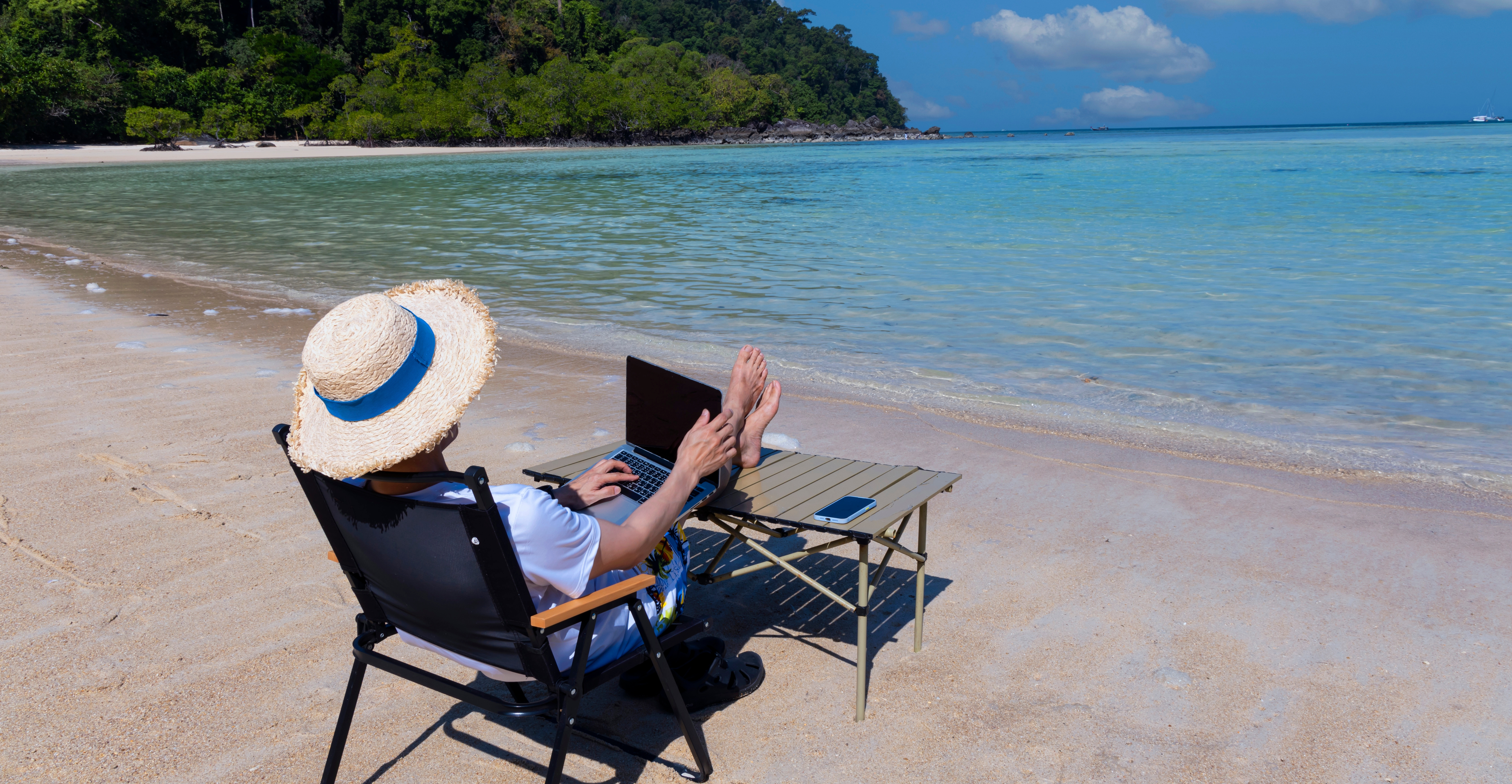A Digital Nomad Visa to Portugal is a special D8 residence visa for remote employees and freelancers. It is intended for individuals who wish to reside in Portugal while working for a foreign company or providing their services remotely as self-employed individuals. A digital nomad visa allows you to request a Portuguese residence permit for two years, which can be extended.
The most important thing to open a D8 visa is to prove the nature of your activities and demonstrate an income of at least EUR 3,480. You must collect the necessary documents, submit them to the consulate, pay the required fee, and wait for approval. After entering Portugal, you must apply for a residence permit within four months. While the program’s terms appear simple at first glance, they are not the most favorable compared to other countries that also issue visas to remote workers.
What are the benefits of a visa for digital nomads in Portugal?
With a digital nomad visa, you can enter Portugal for up to 3 months and apply for a temporary residence permit. A residence permit allows you to legally stay in Portugal for 2 years and then extend your stay. With a residence permit, digital nomads enjoy the following benefits:
- The right to freely travel within the Schengen area. You can stay in any Schengen country without a visa for up to three months in each six-month period. This is convenient for those who often go on vacation, visit relatives, or are looking for another European country to relocate to.
- A path to permanent residence and an EU passport. As a resident of Portugal, you have the right to receive treatment at local hospitals with insurance and to obtain a European Health Insurance Card. This document simplifies treatment conditions in almost all EU countries.
- Opportunity to use European banks. Foreigners without a residence permit have access to a limited range of services. Meanwhile, Portuguese residents can open accounts in Portugal and other reliable European banks.
- High quality of life. Portugal is a warm, safe country with an interesting culture, friendly people, and low prices. The infrastructure for digital nomads is well-developed, and there are many convenient, modern coworking spaces. For example, there is Avila Spaces in Lisbon and Facts Coworking in Porto.
Previously, digital nomads chose Portugal to ease the tax burden — here, they could obtain Non-Habitual Resident status and avoid paying taxes on income earned outside the country. However, when this program closed in 2024, the country’s popularity among remote workers decreased.
Who is eligible for a Portuguese Digital Nomad visa?
Citizens of non-EU countries can apply for a Portuguese freelance visa. The main condition is to meet all the requirements of the Digital Nomad program, which include:
- Prove that you work or provide professional services remotely. This means that your employer or clients must be based outside of Portugal. At the time of application, you must have worked remotely for at least 3 months.
- Confirm your income level. You must earn at least EUR 3,480 per month.
- Purchase health insurance that is valid in Portugal. It must cover all medical expenses, including emergency care and repatriation.
- Be law-abiding. You must not have a criminal record in your home country or any country in which you have lived for at least a year.
- Show proof that you have enough money to live on for a year. You must have at least EUR 10,440 in your bank account — equivalent to 12 Portuguese minimum wages.
Keep in mind that you can apply for a visa in countries other than your country of citizenship. If you have a temporary or permanent residence permit in another country and there is a Portuguese embassy or consulate there, you can apply there. You cannot apply directly in Portugal.
A digital nomad can move with his or her family. Not only a spouse and minor children. You can also take an older dependent child with you if they are unmarried and studying in Portugal. You can also move with your parents if you support them, as well as with brothers and sisters under 18 who are under your guardianship.
Family members are issued a special accompanying visa. You can apply for this visa at the same time as the D8 visa by providing documents proving kinship. However, if you move with relatives, the financial savings requirement increases: You need an additional EUR 5,220 for each adult family member and EUR 3,132 for each child.
- Selecting the most suitable country;
- Consultations and turnkey processing;
- Guaranteed results under the contract.
Required documents for a Digital Nomad Visa
To obtain a Digital Nomad visa, you must prepare the following documents:
- An application: a completed and signed form;
- A passport (original and copy). It must be valid for at least another seven months;
- A certificate of no criminal record (an apostille is required);
- Two passport-size color photographs (3.5 x 4.5 cm);
- Valid travel insurance;
- For hired remote workers, provide an employment agreement or an employer’s statement of employment relations;
- For the self-employed, a service agreement;
- A document confirming tax residency;
- Bank statements showing income and savings for the last 90 days;
- A residence permit or permanent residence permit from the country where you are applying for a visa, if this is not your country of citizenship.
The application form can be downloaded from the official website of the Portuguese Ministry of Foreign Affairs.
If your family is applying for an accompanying visa at the same time, you will need proof of kinship, such as a marriage certificate or birth certificate. If a minor will be traveling with only one parent, notarized permission from the other parent is required, as well as the identity cards of both parents.

How to apply?
Please note that you cannot apply for a digital nomad visa while in Portugal. Applications are accepted by embassies and consulates — you can apply in the country of your citizenship or permanent residence.
Schedule an appointment with the embassy or consulate through the E-Visa portal.
Processing times, costs and challenges
Applications for a Portuguese residence visa are processed within 60 calendar days of submitting all required documents.
The processing fee is EUR 110.
There are a several details to consider when obtaining a digital nomad visa to Portugal. First, the process is often delayed. The next consular appointment may not be available for several months, and applications often take much longer than expected to process, up to six months.
Further complicating matters, embassies and consulates may request additional documents if deemed necessary. They may require more detailed information about your salary source, housing availability in Portugal, and references from clients for whom you provide remote services.
You may be denied a visa if your work is deemed unsuitable; for instance, if your freelance income is unstable, or if your contract does not clearly specify remote work. It’s also advisable that your salary exceeds the minimum requirement of EUR 3,480 per month. In this case, your income may be deemed insufficient if the exchange rate changes during the application review.
The best way to avoid complications is to , who can help you quickly and easily obtain a digital nomad visa for moving abroad.
Next steps after obtaining the visa
The Portuguese Digital Nomad Visa does not grant permanent residence in Portugal. It only permits two entries into Portugal and a four-month stay. During this time, you must obtain a residence permit.
Residence permits are issued by the Agency for Integration, Migration, and Asylum (AIMA). You can schedule an appointment by phone or email. Contact information is available on the agency’s website.
On the day of your visit to the AIMA office, please bring the following:
- A valid passport with the Digital Nomad Visa;
- Two color passport-sized photographs;
- A statement from an employer or client outside of Portugal confirming your employment relationship;
- A sworn statement indicating your residential address in Portugal, along with supporting documents such as a title deed or landlord’s statement.
To be eligible for a residence permit, you must have had a clean criminal record for more than one year.
Your application will be processed within 90 days, after which you will be notified of the decision and the next steps. There is a EUR 127.20 application fee and a EUR 109.30 residence permit issuance fee. Residence status is initially granted for two years and can then be renewed for three-year periods.
Portuguese permanent residency and citizenship for digital nomads
Remote workers can apply for permanent residency after living in Portugal for five years. They must also demonstrate that they have an income, a place to live, and at least a basic knowledge of the Portuguese A2 level. To demonstrate this, they can take an exam at the Center for the Assessment of Portuguese as a Foreign Language (CAPLE) or take a basic course at an educational institution. Applications are submitted to AIMA, and fees of EUR 127.20 and EUR 336.10 apply for application processing and permit issuance, respectively.
Permanent residency allows you to live in Portugal indefinitely; your status will no longer depend on your work activity. This means that if you stop working remotely, your residency will not be revoked and you will not have to find a new basis for living in the country.
After five years of living in Portugal, you can apply for citizenship. In this case, you will also need to demonstrate proficiency in Portuguese. You can submit the application online through a lawyer or in person at an authorized agency, such as a civil registry office. The application fee is EUR 250.
In October 2025, the Portuguese Parliament increased the period of residence required to obtain citizenship from 5 to 10 years.
Portuguese citizenship offers many benefits, including visa-free access to 175 countries and the opportunity to live in any EU country without restrictions.

A comparison of Digital Nomad Visas in Portugal and other countries
Besides Portugal, other countries offer similar visas for freelancers and remote workers.
Spain, for example, offers more attractive relocation conditions. Self-employed freelancers who relocate there can provide services to local clients, which is not permitted under Portuguese law. The Spanish visa also has more lenient income requirements — at least EUR 2,368 per month — with no additional requirement to prove savings. The Spanish Digital Nomad Visa is valid for a full year, after which applicants can apply for a three-year residence permit that can be renewed.
Outside of Europe, many digital nomads choose the United Arab Emirates. The minimum income requirement is EUR 3,500 (approximately EUR 3,020—less than in Portugal). Many are attracted to this country not so much for the visa conditions themselves, but for its quality of life: 0% income tax, modern infrastructure, luxury housing, and first-class healthcare.
I’d always dreamed of being a digital nomad, working remotely while traveling the world. Portugal seemed like the perfect choice, offering a favorable visa policy, a mild climate, and the charming city of Lisbon with its old streets and proximity to the ocean. I researched the cost of living there, looked for apartments, and read about the expat community. The deeper I delved, however, the more challenges I noticed. The visa required a higher income than I expected, and housing prices in Lisbon were prohibitive. During high season, you can’t find a decent apartment for less than EUR 1,200. Since I wanted to move to Europe specifically, I turned my attention to neighboring Spain. Barcelona and Valencia appealed to me immediately with their Mediterranean atmosphere, sunny beaches, and delicious cuisine. Spain also offers a digital nomad visa, and the income requirements are about 30% lower. Additionally, there are more affordable coworking spaces and a vibrant freelance community. After a couple weeks of deliberation and price comparisons, I chose Spain and haven’t looked back. I now live in Valencia: I work with a sea view, drink coffee in local cafés, and I’m already planning trips around Andalusia. Spain has given me the freedom I dreamed of and more—I feel at home.
Not sure which program is right for you? Get in touch with who can help you find the perfect option.
















